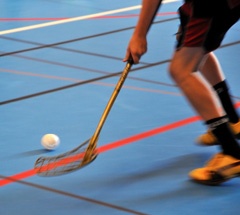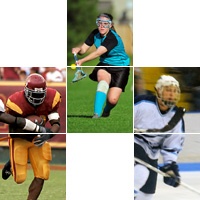 Football, or soccer as we say in the US, is one game played the world over. The tournament for this “world game†is the World Cup and it is happening right now. This is a team sport that truly represents the term intermittent sprint sport and this is a tournament that challenges even the best of the best in the sport. Fitness and readiness for such activities require training at the highest level.
Football, or soccer as we say in the US, is one game played the world over. The tournament for this “world game†is the World Cup and it is happening right now. This is a team sport that truly represents the term intermittent sprint sport and this is a tournament that challenges even the best of the best in the sport. Fitness and readiness for such activities require training at the highest level.
You can’t catch up on performance if you can’t catch your breath
Everyone who plays the game knows it does not feel like the sprints are intermittent because you are constantly moving. You run hard, then you wait but you’re not really standing still, then you suddenly have to run hard again. Unless the wait between runs is long enough, you still haven’t “caught your breathâ€. When asked to describe the impact on breathing and performance of intermittent sports like this, Clay Nicks, PhD., of Columbus State University in Georgia, told us,
 "Many intermittent (or team sports) require continuous repeated bouts of high intensity exercise. As a result, breathing is increased and athletes may experience dyspnea, an uncomfortable awareness of breathing. Severe or prolonged dyspnea can potentially have a negative impact on sports performance. For example, athletes may need more recovery in between bouts of running or the intensity of their exercise could drop."
"Many intermittent (or team sports) require continuous repeated bouts of high intensity exercise. As a result, breathing is increased and athletes may experience dyspnea, an uncomfortable awareness of breathing. Severe or prolonged dyspnea can potentially have a negative impact on sports performance. For example, athletes may need more recovery in between bouts of running or the intensity of their exercise could drop."
Whether you call it football, fútbol, or soccer, or whether you play for your local club or a professional club, you want to be able to play at your best for the entire game or at least as long as the manager or coach will allow.
Fight fatigue with better breathing
Since PowerLung trains the respiratory muscles we asked Dr. Nicks to describe how respiratory muscle training with PowerLung can help athletes train with greater intensity for longer periods and the benefits of this to sports. Dr. Nicks replied,
"Scientific studies have indicated that respiratory muscle training may benefit athletes participating in intermittent sports. Training the respiratory muscles may help delay respiratory muscle fatigue or reduce sensations of breathlessness."

Training the respiratory muscles assures they are at the same match fitness level as other muscles in the body. With a higher level of fitness you can also train longer at higher intensity so your game skills are sharper for longer and you can maintain better game fitness and readiness. Recovery is also a major part of fitness.
Better trained respiratory muscles also mean shorter recovery periods. A soon to be presented study of Turkish soccer players showed those who used PowerLung for respiratory muscle training had a shorter recovery period. This means an athlete has the maximum ability to recover between sprint activity and between matches. A high level of fitness and readiness as well as the ability to recover as quickly as possible is required to keep you playing at the highest level for any tournament, even the World Cupâ„¢.
What you can do to keep in shape during the off season
Sports like, basketball, American football, Lacrosse, rugby, field hockey, ice hockey and even water sports like water polo are team sports also considered intermittent sprint sports. Can one team sport serve as an off season cross training activity for another similar sport. Is there a possibility that a sport like soccer could be a a summer “cross training†sport for another sport like ice hockey, especially for younger players? For information on that, PowerLung decided to talk Mr. Allan Langvee of Coach Depot a specialist in hockey gear and our Canadian distributor. Allan explained that,
"Aside from cardio, and maybe some foot work, there are no real documented ties between Soccer and Hockey.†Mr. Langvee went on add, “My personal opinion though, is that kids should put the skates away in the summer and try other sports. For getting in shape, soccer is a terrific sport and many hockey players do participate in soccer. Keeping the legs and lungs in shape in the off-season is key! One key element in perfecting an on-ice game is through off-ice training. Running, sprinting, quick lateral movements and coordination skills are all improved through soccer. Most of all, it exposes kids to alternate sporting activities which is always important and stimulating."
It was interesting Mr. Langvee pointed out the necessity for maintaining cardio fitness for sports even in the off-season. In independent studies of athletes using PowerLung there are many improvements common across the studies. One of the most important benefits is the reduction in heart rate by the study subjects who used PowerLung. This means using PowerLung helps you maintain cardio efficiency and recovery whether in the off-season or during injury recovery.
 Mr. Langvee also shared with PowerLung a new game that may interest you if you play ice hockey or know someone who does. He said,
Mr. Langvee also shared with PowerLung a new game that may interest you if you play ice hockey or know someone who does. He said,
…there is a sport in Europe which is now hitting North America called Floorball. It is found that Floorball promotes and develops similar skills to hockey and is a good cross training sport.
Do you know about Floorball and play it to stay in shape for ice hockey? Contact us and tell us about your experience.
Are you interested in what PowerLung users who play ice hockey have to say about its benefits for ice hockey? Visit the testimonials section on www.powerlung.com to read the benefits user Gary Lassin experienced. You can also see user experiences with PowerLung in other activities.
If you’d like to read more of Dr. Nicks work, he has done an independent study of intermittent sport (soccer) athletes using PowerLung. You can see it in our independent studies section or read the article at Reuters online.
If you won’t be playing as much soccer because you’re watching the World Cup™ games remember to keep using your PowerLung to keep up your cardio for any sport or activity while you’re not training.



